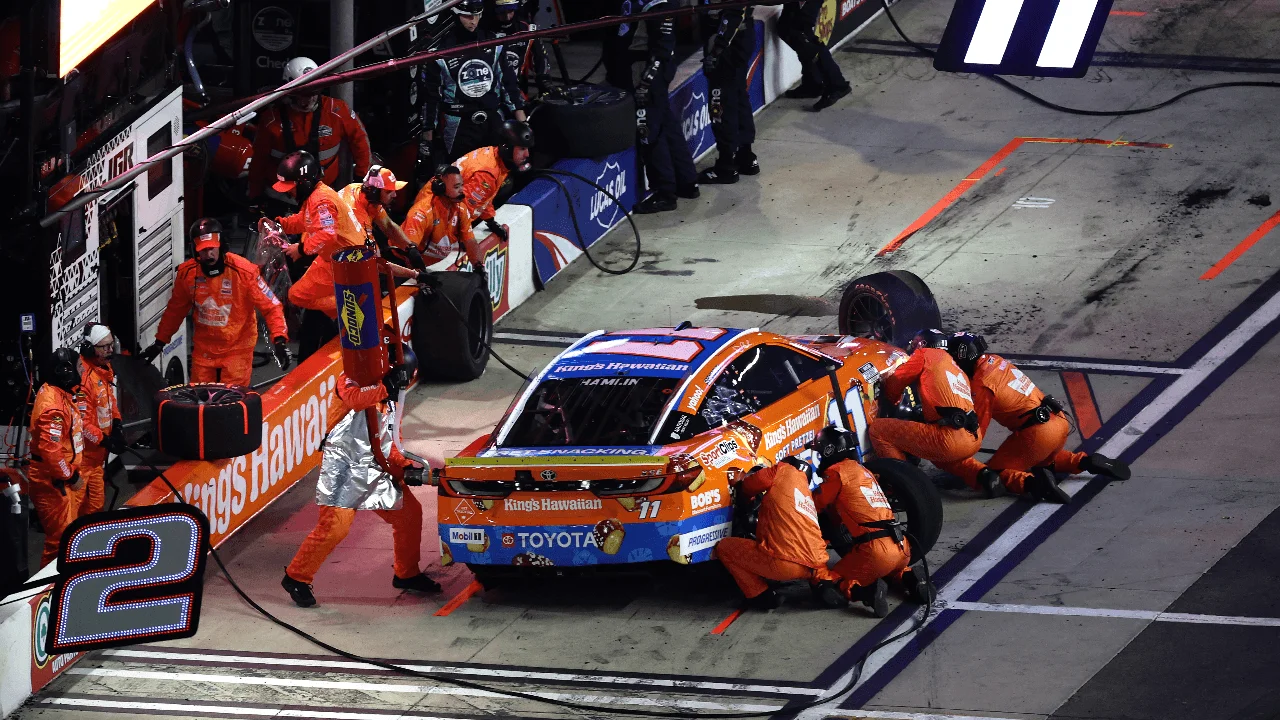NASCAR’s recent penalty to Denny Hamlin’s pit crew sparked a significant shift in how team suspensions will play out during the playoffs, directly affecting the Denny Hamlin crew suspension timeline. The implementation of a new deferment rule allows key crew members Austin Maloney and Joel Bouagnon to remain active for an additional race, which may impact Hamlin’s playoff performance at New Hampshire Motor Speedway.
NASCAR Penalizes Hamlin’s Crew After Bristol Incident
During lap 384 of the NASCAR Cup Series race at Bristol Motor Speedway, Denny Hamlin’s No. 11 toyota/”>Toyota lost its right-front wheel while under green flag conditions. This led to NASCAR issuing a harsh penalty on September 16, suspending front tire changer Austin Maloney and jackman Joel Bouagnon for two races. The incident left Joe Gibbs Racing facing a strategic dilemma at a critical point in the playoff schedule, as the absence of these primary crew members could influence Hamlin’s results in the next round.
Understanding NASCAR’s Deferment Rule and Its Application
However, NASCAR introduced a new rule prior to the 2025 campaign which states that teams may defer penalties for non-behavioral infractions for one week. This modification permits Maloney and Bouagnon to join Hamlin at New Hampshire Motor Speedway before serving their suspension. The adjustment offers Hamlin’s team a vital opportunity to avoid relying on backup crew members in a challenging playoff environment.
Strategic Importance of Crew Continuity at New Hampshire
The deferment is particularly relevant given the timing of the races. Without this rule, Hamlin would have entered both the Round of 12 opener at New Hampshire and the subsequent event at Kansas Speedway without his main jackman and front tire changer. With Maloney and Bouagnon available for New Hampshire, Hamlin’s playoff prospects improve due to their skill and familiarity, especially at a venue where pit road success is often a deciding factor.
Pit strategy at New Hampshire is exceptionally influential due to the difficulty of passing on the track. Having regular pit crew members can mitigate errors and maintain track position, both of which are essential to success at NHMS. In contrast, road course venues like the Charlotte Motor Speedway ROVAL offer more flexibility because mistakes during green-flag cycles are less damaging due to race dynamics.
Hamlin’s Statistical Edge at New Hampshire
Denny Hamlin’s record at New Hampshire Motor Speedway adds to the logic behind deferring the penalty. Over 31 starts at the Magic Mile, he has achieved 19 top-10 finishes and three wins, his most recent in 2017. This history, combined with a strong car and complete pit team, sets the stage for another strong showing as Hamlin looks to secure his spot in the next playoff round.
The significance of keeping the core crew together extends beyond immediate performance. If Hamlin can capitalize on the New Hampshire race and clinch a victory, the importance of Maloney and Bouagnon’s later absence in the Round of 12 finale at Charlotte may be reduced, making the penalty strategically manageable.
Potential Risks of Deferred Suspensions
Despite the advantages, the penalty deferment comes with possible drawbacks. Even if Hamlin performs well at New Hampshire, both Maloney and Bouagnon must still serve their two-race suspension. Their enforced absence during the last two races of the Round of 12 could jeopardize Hamlin’s hopes should he not secure a win or build a substantial points buffer. The risk increases if unforeseen setbacks arise at Kansas or Charlotte, particularly if pit road factors into the outcome.
Should Hamlin approach the cutoff race at the ROVAL near the elimination threshold and without his experienced jackman and tire changer, the deferred penalty could become a critical concern. Nonetheless, Joe Gibbs Racing’s strategy hinges more on current advantages than hypotheticals, with much of the paddock predicting Hamlin’s advancement to the Round of 8 given his season’s performance.
Looking Ahead: Plausible Outcomes of NASCAR’s Rule Shift
NASCAR’s rule change, by allowing the deferral of the Denny Hamlin crew suspension, marks a significant alteration in how teams manage adversity during the postseason. If Hamlin’s team maximizes their New Hampshire opportunity and secures progress, the deferment will be viewed as a smart, tactical move by Joe Gibbs Racing. Conversely, a run of bad luck at Kansas or Charlotte that leads to playoff elimination may push the deferment decision to the background, forgotten among other playoff storylines.
In the coming weeks, all eyes will be on how the No. 11 team fares without two regular pit crew members, and whether the scheduling reprieve translates into the playoff advantage they seek. The outcome will likely shape how teams approach penalties under the evolving NASCAR rulebook moving forward.
